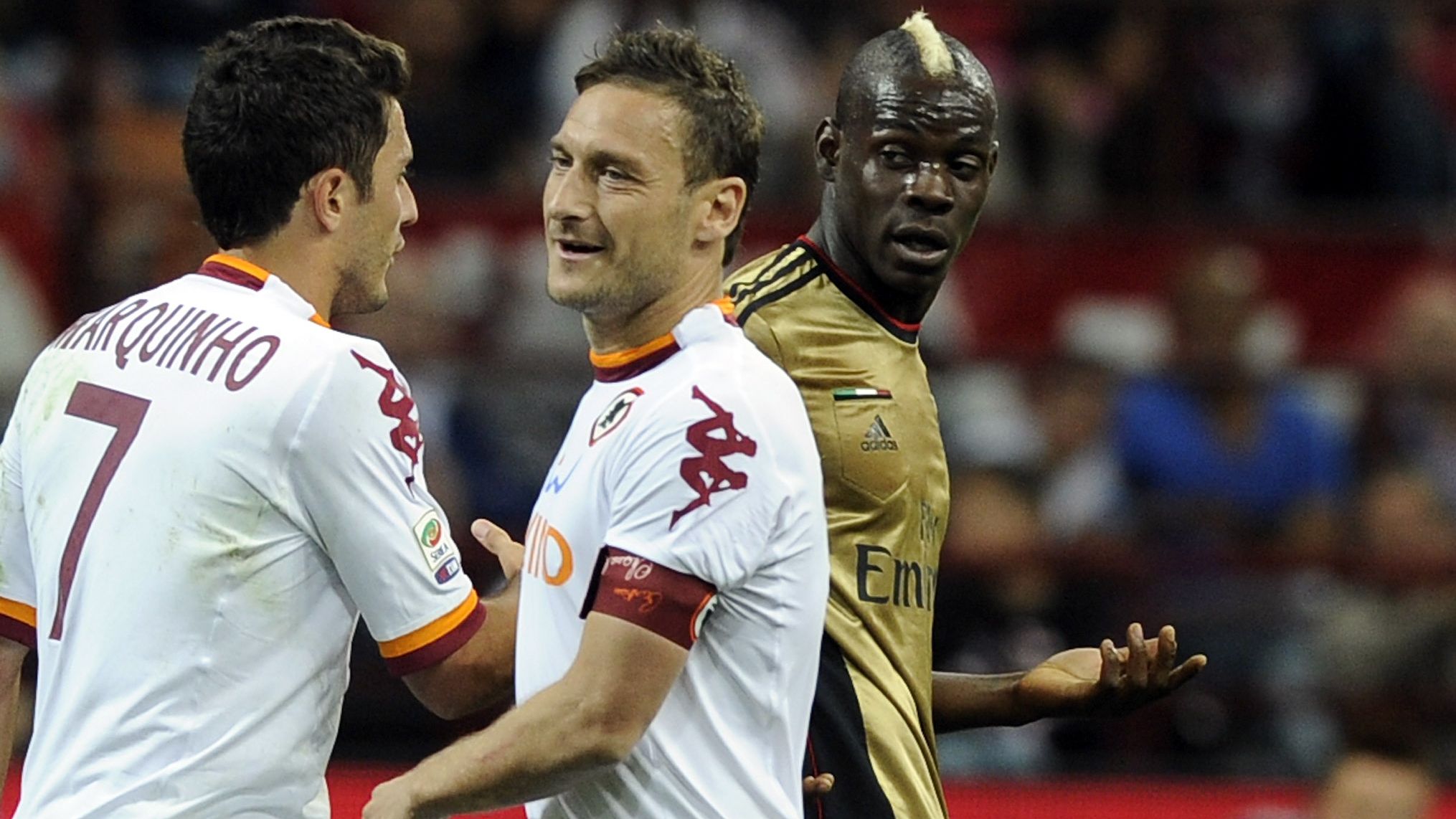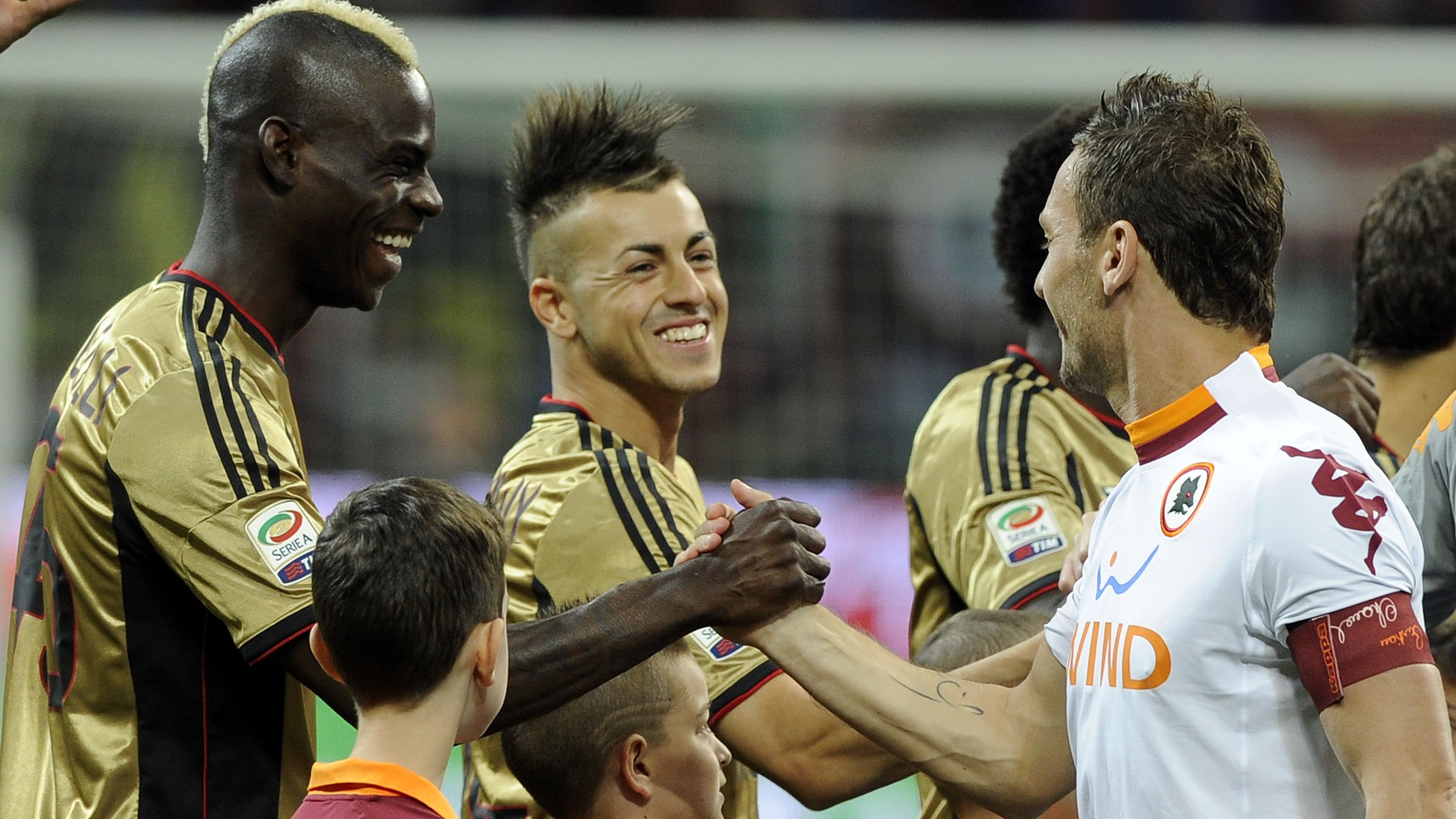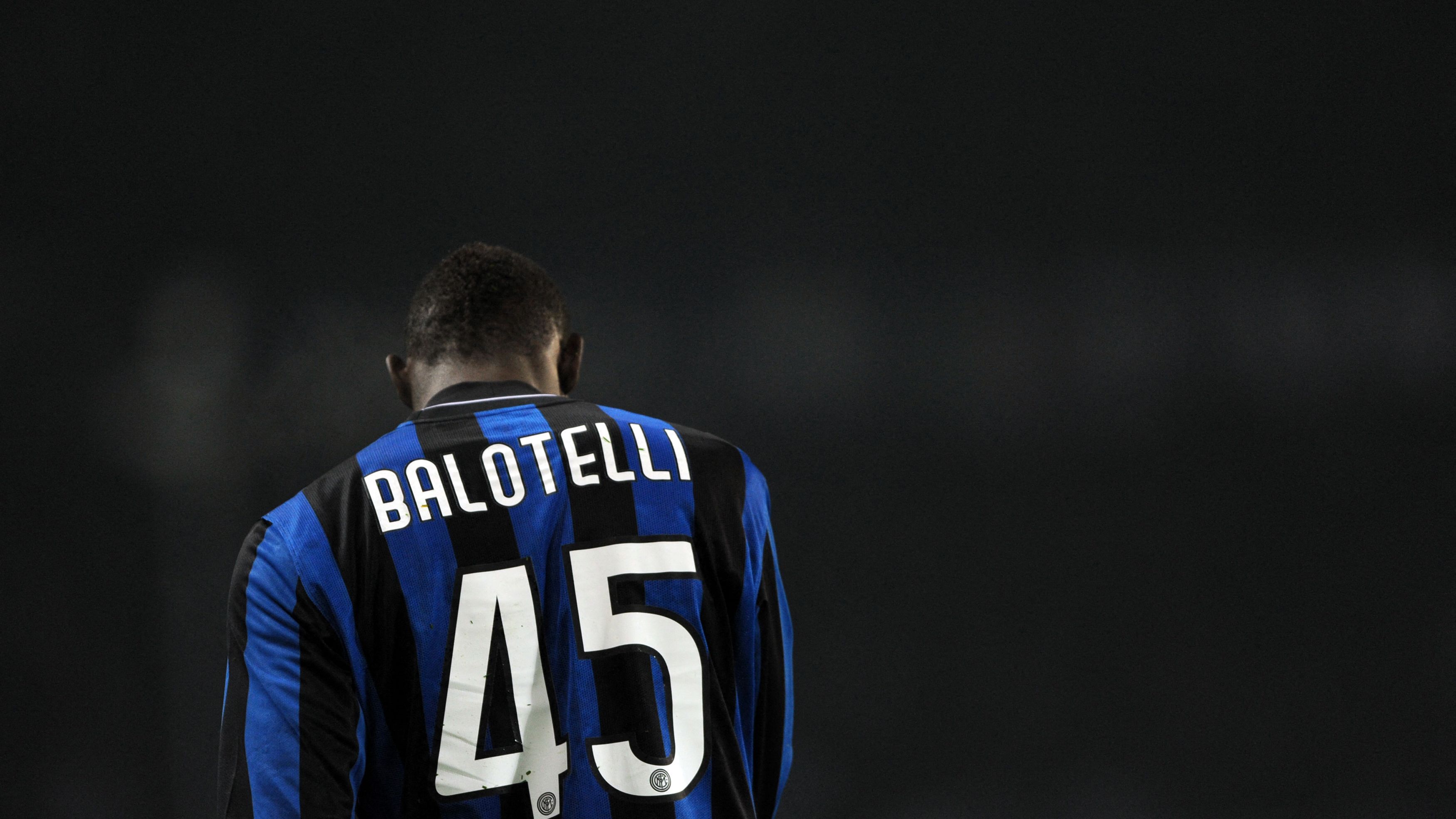Unveiling Totti’s Heated Rivalry with Balotelli: A Deep Dive into Football’s Most Intense Moments
Francesco Totti, the iconic Roma legend, has shared intimate details about his career’s ups and downs, offering a fresh perspective on his actions and decisions that defined his legacy in Italian football.



Totti’s Calculated Clash with Balotelli in the Coppa Italia
In a revealing conversation, the former Roma star explained how his deliberate action against Mario Balotelli during the 2010 Coppa Italia showdown stemmed from accumulated discontent with the player’s conduct. Speaking openly on the ‘Fenomeni’ podcast with ex-teammate Luca Toni via Amazon Prime, Totti delved into the key controversies of his professional journey, his fractured ties with coach Luciano Spalletti, and the profound distress of his abrupt exit from the game.
The Backstory of the Infamous Red Card
Totti’s ejection in the closing stages of the 2010 match between Roma and Inter wasn’t a spur-of-the-moment outburst, as he now clarifies. Entering as a substitute in the second half, he was sent off in the 87th minute during a 1-0 defeat, admitting that his aggressive move was a purposeful response to Balotelli’s irritating style on the pitch.
Totti’s Own Words on the Incident
“The situation with Balotelli built up over time,” Totti shared. “He possessed incredible talent and youth, yet his overconfidence and self-assurance grated on me. That day, my focus wasn’t on tying the score; I simply waited for the chance to react and force him out. Later, we talked it through, I offered my regrets, and we moved past it with some humor.”
Balotelli’s Counterpoint
From Balotelli’s viewpoint, expressed elsewhere, he believed Totti’s frustration was aimed incorrectly. “I don’t see that as the real trigger for his outburst,” Balotelli noted. “In that Coppa Italia final, his irritation seemed tied to the manager’s choice to bench him initially, fueling his agitation on the field.”
The Deterioration of Totti’s Relationship with Spalletti
Totti didn’t shy away from discussing the total collapse of his professional bond with manager Luciano Spalletti upon the coach’s return to Roma in 2016, accusing him of having a predetermined plan, endorsed by the club’s leaders, to end his playing days.
Spalletti’s Alleged Intentions
“From my perspective, Spalletti came back in 2016 solely to force my retirement, with full backing from the organization,” Totti remarked. “Our interactions were fraught with issues; he was completely different from the supportive figure I knew in 2005. Maybe he thought I orchestrated his departure by favoring Ranieri, but that’s inaccurate-the club’s executives consulted me and fellow players on options like Mancini or Ranieri.”
The Heartache of Totti’s Forced Retirement from Roma
The Roma hero vividly described the overwhelming sorrow of learning that his quarter-century tenure at his lifelong team was concluding, feeling greater betrayal from the club than from Spalletti himself. His final appearance at the Stadio Olimpico in May 2017 marked a devastating chapter that left him adrift.
Reflecting on the End of an Era
“The decision to retire came directly from the club,” he disclosed. “I’m aware that every career has its endpoint, but I was still physically and mentally capable. In that moment, Roma let me down more than Spalletti did; I felt like an obstacle. I was ready to play without pay, pouring all my effort into the team. Stepping away made me feel unanchored, leading to daily tears for weeks. It was as if I was torn from a lifelong bond, similar to losing a close family tie.”
Addressing Other Regrettable Episodes in Totti’s Career
During the interview, Totti confronted additional low points, including his deep remorse for an impulsive act against Denmark’s Christian Poulsen at Euro 2004, which resulted in a harsh penalty, and a hidden confrontation involving defender Francesco Colonnese.
Regret Over the Poulsen Incident
“Even now, I can’t fully grasp that I did it-spitting at him fills me with embarrassment,” Totti admitted. “It’s a deplorable action that no athlete should tolerate, as it’s completely dishonorable.” He also clarified the Colonnese episode: “His words about my son Cristian pushed me over the edge.”
Totti’s Unwavering Devotion to Roma
Amid all the disclosures, Totti’s steadfast commitment to Roma emerged as the core element, as he reiterated his choice to turn down high-profile offers, such as one from Real Madrid, to remain with the club from his early days.
A Legacy of Loyalty
“Wearing any other team’s colors was never an option for me, and I stand by that decision fully,” he emphasized. “My path was always tied to Roma or the city itself. Right from the start, I knew: this is where I began, and this is where I’ll end. It’s rare to find someone who dedicated themselves as I did to their fans and their uniform.” This dedication highlights the enduring impact of a player who spent his entire career with one team, captivating audiences with his dramatic and stellar path long after his poignant departure.
The Infamous Red Card Confrontation Between Francesco Totti and Mario Balotelli
Background of the Incident
In the world of Italian football, few moments stand out as vividly as the heated clash between Francesco Totti and Mario Balotelli during a Serie A match in 2013. Totti, the iconic captain of AS Roma, had built a legacy of passion, loyalty, and skill over two decades with the club, making him a symbol of Roma’s rich history. Balotelli, known for his explosive talent and controversial antics, was playing for AC Milan at the time. This confrontation not only highlighted the intense rivalries in Italian football but also shed light on personality clashes that can define a player’s reputation.
The incident occurred during a fiery match at the Stadio Olimpico, where tensions boiled over in the second half. Balotelli’s aggressive style on the pitch led to a physical altercation with Totti, culminating in Balotelli receiving a red card. Totti later described Balotelli as “arrogant and presumptuous,” a label that sparked widespread debate among fans and analysts. This event became a pivotal moment in AS Roma’s history, illustrating how individual egos can influence team dynamics and match outcomes in high-stakes Italian football encounters.
Totti’s Explanation of the Label
Francesco Totti’s comments about Mario Balotelli being “arrogant and presumptuous” stemmed from what he perceived as disrespectful behavior during the game. In interviews following the match, Totti explained that Balotelli’s on-field actions, including unnecessary provocations and a lack of respect for opponents, embodied a attitude that prioritized individual flair over team ethos. Totti, who embodied humility and dedication to AS Roma throughout his career, saw this as a direct contrast to his own values.
Digging deeper, Totti elaborated that Balotelli’s presumption came from an overconfidence that often led to impulsive decisions, like the one that resulted in his red card. For instance, Totti mentioned in post-match reflections how Balotelli’s style-marked by showboating and disregard for tactical discipline-could undermine the spirit of the game. This explanation resonated with many in the Italian football community, as it highlighted the fine line between confidence and arrogance in professional sports.
Details of the Confrontation
The red card confrontation itself was a flashpoint in what was already a tense Serie A fixture. During the game, Balotelli engaged in a series of challenges that escalated quickly, leading to a direct exchange with Totti near the penalty area. Witnesses described Balotelli’s gestures as taunting, which Totti interpreted as a sign of disrespect toward AS Roma’s legacy and his personal stature in Italian football.
In the immediate aftermath, referees intervened, and Balotelli was sent off, leaving Milan short-handed. Totti’s frustration boiled over in the moment, but his later explanations provided context, emphasizing how such incidents can derail a team’s strategy in crucial matches. This event not only affected the game’s outcome but also became a case study in how player interactions can lead to broader discussions about sportsmanship in Italian football.
Impact on AS Roma’s History
The Totti-Balotelli incident had lasting ripples in AS Roma’s history, reinforcing the club’s identity as a team built on tradition and resilience. For AS Roma fans, Totti’s response exemplified the fighting spirit that defines their team’s legacy, turning the event into a rallying point for future seasons. It also sparked conversations about mental toughness in Italian football, with Totti’s handling of the situation often cited as an example of leadership under pressure.
This confrontation influenced how AS Roma approached player management and team culture, emphasizing the need for unity to overcome individual conflicts. Over time, it became a benchmark for discussing similar incidents in Italian football, from heated derbies to international matches, and helped shape narratives around star players like Totti.
Benefits and Practical Tips from the Incident
While the confrontation was negative, it offers valuable lessons for athletes and fans alike. One key benefit is the importance of emotional intelligence in sports; understanding how to channel frustration can prevent escalations like this one. For young players aspiring to succeed in Italian football, Totti’s experience underscores the value of maintaining composure amid rivalry.
Here are some practical tips drawn from this event:
- Develop Self-Awareness: Recognize when confidence borders on arrogance, as Balotelli’s actions demonstrated. Athletes can practice mindfulness techniques, like deep breathing during games, to stay grounded.
- Foster Team Respect: Totti’s loyalty to AS Roma highlights how respecting opponents and teammates builds a stronger team dynamic. Coaches might implement team-building exercises to promote this.
- Learn from Setbacks: Use incidents like this as growth opportunities. Balotelli could have reflected on his red card to refine his approach, potentially improving his career trajectory in Italian football.
- Seek Mentorship: Aspiring players should emulate figures like Totti by seeking guidance from veterans, helping them navigate the presumptuous pitfalls of professional sports.
Case Studies and First-Hand Experiences
Examining similar cases in Italian football provides deeper insights. For example, during the 2010 World Cup, Balotelli’s erratic behavior in other matches mirrored his confrontation with Totti, leading to team disruptions and public scrutiny. In contrast, Totti’s career offers a first-hand experience of redemption; he faced his own controversies early on but channeled them into legendary status with AS Roma.
Another case study involves other AS Roma players, like Daniele De Rossi, who dealt with on-field tempers but learned to prioritize team goals, much like Totti advocated. These examples show how labeling behavior as “arrogant and presumptuous” can serve as a catalyst for personal growth, making this incident a teachable moment in Italian football history.
Through these lenses, the Totti-Balotelli saga remains a compelling topic, offering timeless lessons on handling conflict in high-pressure environments. Whether you’re a fan of AS Roma or simply interested in Italian football dynamics, this event illustrates the human side of the sport, encouraging better behavior on and off the pitch.









